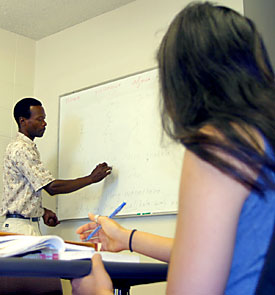 |
|
TERRI WALTZ/Arizona Daily Wildcat
|
Microbiology senior Tina Wu attends a critical language class on Swahili yesterday afternoon, taught by Teles Machibya. Critical language classes, offer traditionally less-popular languages that range from Dutch to Hindi to Uzbek. The program is currently very low on student enrollment. At least four students must be interested in one of the languages to start a class.
|
|
By Stephanie Schwartz
Arizona Daily Wildcat
September 20, 2002
Two students sit around a table learning simple sentences from a tutor like "Mary and John are friends."
They're speaking in Swahili, and the tutor, Teles Machibya, is a native Swahili speaker.
Across campus, 175 students are learning 14 different languages, from Vietnamese to Polish, all as part of the critical languages program at the UA.
The program, which began 11 years ago, offers some of the traditionally less-popular languages for a U.S. university, like Hindi, Scots-Gaelic and Tagalog.
"We respond to students' needs," said Alexander Dunkel, director of the critical language program. "The need is growing for these classes."
But the critical languages department is thinking about targeting high schools to inform students of the program, Dunkel said.
The program began in 1988 with four students studying Hungarian. There are now 175 students, studying 14 languages. In recent years, the program has also offered courses in Czech, Hindi-Urdu, Hungarian, Indonesian, Irish-Gaelic, Kazakh, Korean, Swahili, Swedish, Turkish, Ukrainian and Uzbek.
Tutors teach classes and prepare students for final exams given by an examiner. The classes are "audio lingual," or run with the help of cassette tapes to learn the language. CDs are also available with the language programs.
"We try to tell students about the programs," Dunkel said. "But the languages start not because we need them, but because students ask for the programs."
At least four students must be interested in a language to start a class. Students pay $260 to enroll for a four-unit class.
The fee goes directly to the program, paying to bring an examiner to each class for final exams each semester and help pay the tutors who teach the classes, Dunkel said.
The examiner, an expert in the language, establishes the class curriculum and tests each student to ensure they are up to the language level set by the National Association of Self Instruction Language Program (NASILP). The examiner also advises and examines the capabilities of the tutors.
Tutors meet with the students twice a week for one hour and are native speakers of the languages they teach, Dunkel said. Students are expected to study an hour per day outside of class.
Classes are held in small rooms around a table and have between four and seven students.
"I thought there would be more students in the class," said Tina Wu, a psychology and molecular and cellular biology senior. "But it's good because we get more tutoring. We're learning a lot."
Another student put her language to use.
"I spent three months in Tanzania and learned just enough to be confused," said Melissa Crago, a molecular and cellular biology senior. "A lot of the stuff we learned is starting to make sense now."
The critical languages department is a part of the college of Humanities. Because of the student fee, there is no limit to the number of students the department can accept, Dunkel said.
Students cannot receive a major in any of the critical languages because the program is not an actual department, said Shirley McDowell, critical languages program coordinator.
Students have petitioned and received minors in their language. There has been talk of making a minor available officially, Dunkel said.

